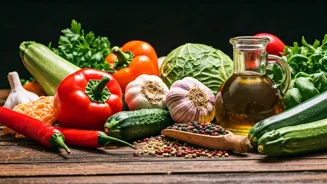The Essence of Food
Food plays a fundamental role in our lives, serving not only as nourishment but also as a source of culture, community, and personal expression. It has
a unique way of bringing people together, whether it's through a shared meal at a family gathering or exploring new flavors with friends. The preparation and consumption of food have been integral parts of societies across the globe. Each culture boasts its own set of traditions, ingredients, and culinary techniques passed down through generations. Consider Indian cuisine's aromatic spices, Italian cuisine's fresh pasta, or Japanese cuisine's meticulous presentation – they represent the rich diversity. Food allows people to connect with their roots, celebrate milestones, and create lasting memories. It reflects both personal and collective identities, communicating stories and values. Food isn’t just about taste; it’s a dynamic aspect of human existence, from simple meals to elaborate feasts. It connects us to the planet, shapes our understanding, and fosters connections.
Global Culinary Journeys
Embarking on a culinary journey around the world means exploring the diverse cuisines that make up global food culture. Asian cuisine, for instance, offers a spectrum of flavors. From the fiery curries of Thailand to the delicate sushi of Japan and the fragrant spices of India. Each dish tells a story of its origin, ingredients, and techniques, revealing complex culinary histories. European cuisine, with its rustic charm and sophisticated elegance, showcases regional variations like French pastries, Italian pasta, and Spanish tapas. These are just a few examples. In South America, the vibrant flavors of ceviche, empanadas, and chimichurri reflect the region's passion for fresh ingredients and bold tastes. Throughout Africa, the influence of local resources and age-old methods creates stews, grilled meats, and flavorful side dishes. Experiencing these culinary offerings involves more than just eating. It’s about immersing oneself in the traditions, stories, and culinary art of various cultures.
Cooking Techniques: An Overview
Cooking is an art form that involves various techniques. Mastery of these techniques transforms simple ingredients into exceptional dishes. Sautéing, where food is cooked quickly in a pan with a little oil or fat, enhances the flavors while keeping the food moist and tender. Grilling, using high heat to create seared exteriors with juicy interiors, produces a smoky flavor. Baking involves dry-heat cooking in an oven, ideal for pastries, bread, and roasts. Braising, which uses a combination of wet and dry heat, is perfect for tougher cuts of meat. From chopping vegetables to seasoning, these techniques are the building blocks of cooking. Understanding each method allows cooks to manipulate ingredients and create new textures. These techniques enable cooks to manipulate and transform various ingredients into a wide range of culinary creations. Mastering techniques is important for aspiring chefs and home cooks alike because it builds confidence and allows them to experiment with flavors and create their own personalized dishes.
Food's Social Significance
Food plays a crucial role in society, from small family dinners to elaborate social events. Meals bring people together, allowing them to share experiences, build relationships, and strengthen community bonds. Celebrations and holidays around the world feature distinctive dishes and culinary traditions, adding to the joy and sense of unity. Think of Diwali celebrations, where families gather to share traditional sweets and meals, or the traditional Christmas feasts. Meals also function as a way to establish social hierarchies, signify hospitality, and convey cultural identities. The preparation and sharing of food offer chances to learn, share stories, and develop a sense of belonging. Food serves as a bridge between people, fostering camaraderie and generating memories. Food promotes social interaction and encourages empathy, promoting mutual understanding and strengthening interpersonal bonds, whether through casual dining or community feasts.
Essential Kitchen Tips
Building a strong foundation in the kitchen requires acquiring several key techniques and understanding fundamental principles. Firstly, efficient meal planning and preparation are essential. Before you begin cooking, organize your ingredients and tools. Next, familiarize yourself with cooking times and temperatures to produce consistent results. Precision and using reliable measurements are fundamental to the success of recipes. Choosing fresh, high-quality ingredients is critical. Proper food safety practices, which include washing hands, preventing cross-contamination, and handling food safely, are also critical. Finally, tasting and adjusting flavors throughout the cooking process allow you to customize dishes to individual preferences. By adhering to these recommendations, both experienced cooks and beginners can create delicious and satisfying meals. These small steps, like mastering knife skills or knowing how to season, elevate your abilities.













